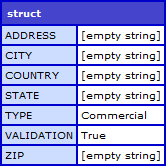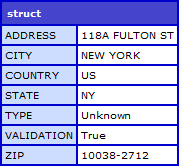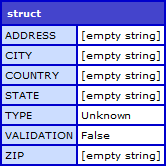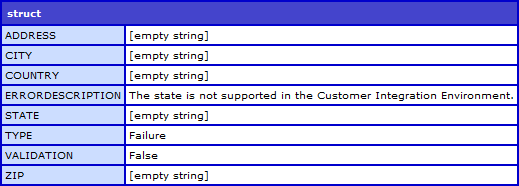UPS API documentation sucks! I just have to say that out loud before I start this post.
This ColdFusion function will connect with the UPS Address Verification API. To use it, you must first have a UPS license number, a username, and a password for UPS shipping API. You can get that by registering in here. This is a simple Function that performs a simple task. Just fill in the address, city, state, zip, and country, and the function will tell you whether the address is correct. If it’s not, the function may suggest a correct address. UPS API login details are shown in my application file as application.UPSLicense, application.UPSUserId and application.UPSPassword.
Here is the function first:
1: <cffunction name="AddressVerification" access="remote" returntype="struct" output="true"> 2: <cfargument name="address" type="string" required="yes"> 3: <cfargument name="city" type="string" required="yes"> 4: <cfargument name="state" type="string" required="yes"> 5: <cfargument name="zip" type="string" required="yes"> 6: <cfargument name="country" type="string" required="No" default="US"> 7: <cfargument name="License" type="string" required="No" default="#application.UPSLicense#"> 8: <cfargument name="UserId" type="string" required="No" default="#application.UPSUserId#"> 9: <cfargument name="Password" type="string" required="No" default="#application.UPSPassword#"> 10: <cfargument name="Request" type="string" required="No" default="3"> 11: 12: <cfset var local = StructNew()> 13: 14: <cfsavecontent variable="local.reqxml"><cfoutput> 15: <?xml version=
"1.0"?>
16: <AccessRequest xml:lang="en-US"> 17: <AccessLicenseNumber>#arguments.License#
</AccessLicenseNumber> 18: <UserId>#arguments.UserId#
</UserId> 19: <Password>#arguments.Password#
</Password> 20: </AccessRequest> 21: <?xml version=
"1.0"?>
22: <AddressValidationRequest xml:lang="en-US"> 23: <Request> 24: <TransactionReference> 25: <CustomerContext>Address Varification</CustomerContext>
26: <XpciVersion>1.0
</XpciVersion> 27: </TransactionReference> 28: <RequestAction>XAV
</RequestAction> 29: <RequestOption>#arguments.Request#
</RequestOption> 30: </Request> 31: <AddressKeyFormat> 32: <AddressLine>#arguments.address#
</AddressLine> 33: <PoliticalDivision2>#arguments.city#
</PoliticalDivision2> 34: <PoliticalDivision1>#arguments.state#
</PoliticalDivision1> 35: <PostcodePrimaryLow>#arguments.zip#
</PostcodePrimaryLow> 36: <CountryCode>#arguments.country#</CountryCode>
37: </AddressKeyFormat> 38: </AddressValidationRequest> 39: </cfoutput></cfsavecontent> 40: <cfset local.out = StructNew()> 41: <cfset local.out.validation = ""> 42: <cfset local.out.address = ""> 43: <cfset local.out.city = ""> 44: <cfset local.out.state = ""> 45: <cfset local.out.zip = ""> 46: <cfset local.out.country = ""> 47: 48: <cftry> 49: <cfhttp url="https://wwwcie.ups.com/ups.app/xml/XAV" method="post" result="result"> 50: <cfhttpparam type="xml" name="data" value="#local.reqxml#"> 51: </cfhttp> 52: <cfset local.results = XMLParse(result.Filecontent)> 53: <cfcatch> 54: <cfset local.out.validation = "False"> 55: <cfset local.out.type = "Failure"> 56: <cfset local.out.ErrorDescription = "Connection Failure"> 57: </cfcatch> 58: </cftry> 59: 60: <cfif IsDefined('local.results.AddressValidationResponse.AddressClassification.Description.XmlText')> 61: <cfset local.out.type = local.results.AddressValidationResponse.AddressClassification.Description.XmlText> 62: <cfif not IsDefined('local.results.AddressValidationResponse.AddressKeyFormat')> 63: <cfset local.out.validation = "False"> 64: <cfelse> 65: <cfset local.out.validation = "True"> 66: <cfif not local.results.AddressValidationResponse.AddressKeyFormat.AddressLine.XmlText eq trim(arguments.address) or 67: not local.results.AddressValidationResponse.AddressKeyFormat.PoliticalDivision2.XmlText eq trim(arguments.city) or 68: not local.results.AddressValidationResponse.AddressKeyFormat.PoliticalDivision1.XmlText eq trim(arguments.state) or 69: not local.results.AddressValidationResponse.AddressKeyFormat.PostcodePrimaryLow.XmlText eq trim(listfirst(arguments.zip,'-'))> 70: <cfif IsDefined('local.results.AddressValidationResponse.AddressKeyFormat.AddressLine.XmlText')> 71: <cfset local.out.address = local.results.AddressValidationResponse.AddressKeyFormat.AddressLine.XmlText> 72: </cfif> 73: <cfif IsDefined('local.results.AddressValidationResponse.AddressKeyFormat.PoliticalDivision2.XmlText')> 74: <cfset local.out.city = local.results.AddressValidationResponse.AddressKeyFormat.PoliticalDivision2.XmlText> 75: </cfif> 76: <cfif IsDefined('local.results.AddressValidationResponse.AddressKeyFormat.PoliticalDivision1.XmlText')> 77: <cfset local.out.state = local.results.AddressValidationResponse.AddressKeyFormat.PoliticalDivision1.XmlText> 78: </cfif> 79: <cfif IsDefined('local.results.AddressValidationResponse.AddressKeyFormat.PostcodePrimaryLow.XmlText')> 80: <cfset local.out.zip = local.results.AddressValidationResponse.AddressKeyFormat.PostcodePrimaryLow.XmlText> 81: </cfif> 82: <cfif IsDefined('local.results.AddressValidationResponse.AddressKeyFormat.PostcodePrimaryLow.XmlText')> 83: <cfset local.out.zip = local.results.AddressValidationResponse.AddressKeyFormat.PostcodePrimaryLow.XmlText> 84: <cfif IsDefined('local.results.AddressValidationResponse.AddressKeyFormat.PostcodeExtendedLow.XmlText')> 85: <cfset local.out.zip = '#local.results.AddressValidationResponse.AddressKeyFormat.PostcodePrimaryLow.XmlText#-#local.results.AddressValidationResponse.AddressKeyFormat.PostcodeExtendedLow.XmlText#'> 86: </cfif> 87: </cfif> 88: <cfif IsDefined('local.results.AddressValidationResponse.AddressKeyFormat.AddressLine.XmlText')> 89: <cfset local.out.country = local.results.AddressValidationResponse.AddressKeyFormat.CountryCode.XmlText> 90: </cfif> 91: </cfif> 92: </cfif> 93: <cfelse> 94: <cfset local.out.validation = "False"> 95: <cfset local.out.type = "Failure"> 96: <cfif IsDefined('local.results.AddressValidationResponse.Response.Error.ErrorDescription.XmlText')> 97: <cfset local.out.ErrorDescription = local.results.AddressValidationResponse.Response.Error.ErrorDescription.XmlText> 98: <cfelse> 99: <cfset local.out.ErrorDescription = ""> 100: </cfif> 101: </cfif> 102: 103: <cfreturn local.out> 104: </cffunction> Here is a bit more information about the result structure.
This is what you get if the address you provided is correct, i.e. it was verified successfully. Here is my correct example:
AddressVerification('118A FULTON ST','NEW YORK', 'NY', '10038'),
It returns the TYPE of address (Commercial or Resident), VALIDATION = TRUE, and the other fields remain empty.

If the address is wrong, as with my mistyped and ZIP Code missing address here:
AddressVerification('118A FaLTON ST','NEW YORK', 'NY', ')
UPS may return a suggested address.

If the address is wrong and UPS does not suggested an address, as with this fake address:
AddressVerification('118A Fake ST','NEW YORK', 'NY', '10038'),
then Validation = False.

If the address verification fails completely, as happened when I tried to verify the UPS head office address here:
AddressVerification('55 Glenlake Parkway NE','Atlanta', 'GA', '30328'),
it will return Type = Failure and an Error Description message.

Posted by Saman W Jayasekara at Friday 15 October 2010 11:42 AM
.
Shipping API
.
ColdFusion

Joe
Thursday 21 July 2011 03:50 PM
I tried using this to verify a canadian address (passing country 'CA'), but I keep getting the below ERRORDESCRIPTION even though I know my canadian address is valid.
ERRORDESCRIPTION: The state is not supported in the Customer Integration Environment.
Is 'CA' the correct country value to pass into the country argument of this function?
Saturday 23 July 2011 11:47 PM
Hi Joe, I’m not really sure since I have not tried CA. you have to make sure the State is correct too. http://www.ups.com/worldshiphelp/WS12/ENU/AppHelp/Codes/State_Province_Codes.htm
 Show/Hide Line Numbers . Full Screen . Plain
Show/Hide Line Numbers . Full Screen . Plain





